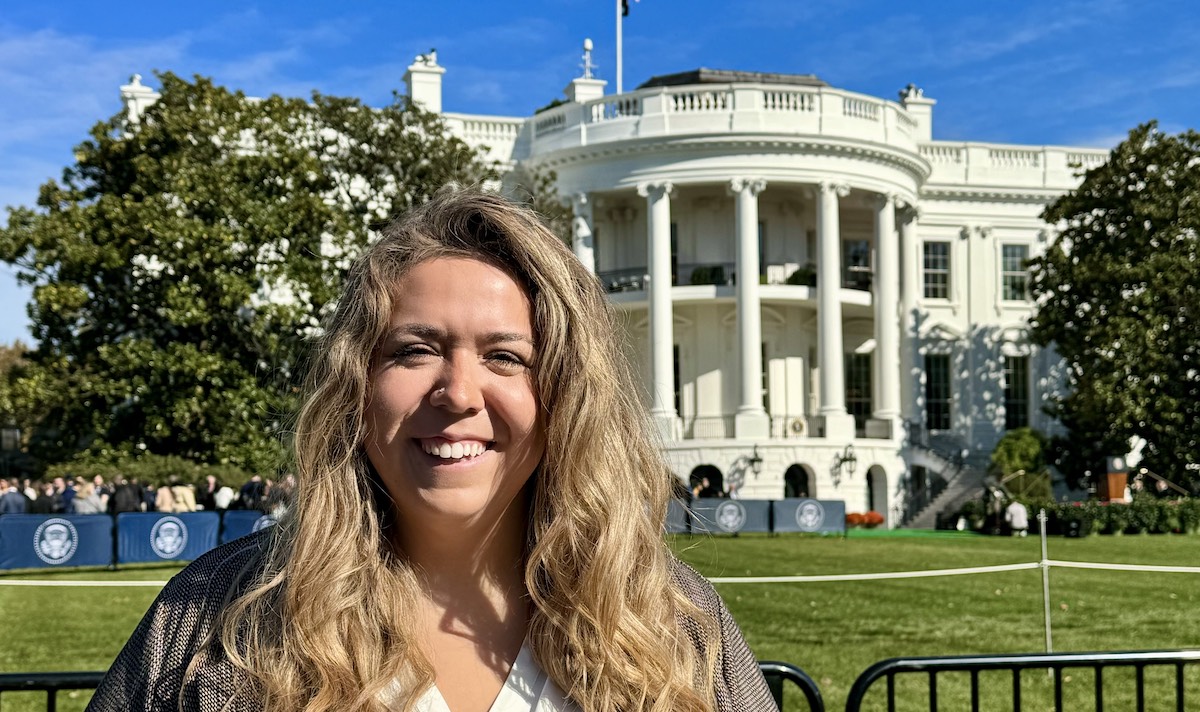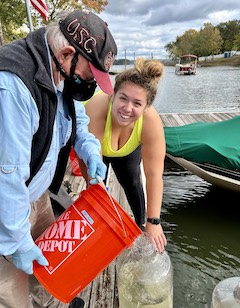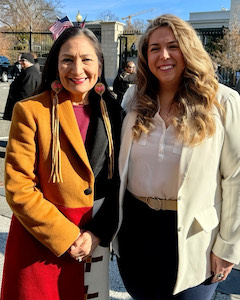From PC to DC: Maggie Carson ’14 completes NOAA policy fellowship at the White House

Maggie Carson ’14 has been working at the White House as an Ocean Policy Fellow through the National Oceanic and Atmospheric Administration (NOAA) Sea Grant Knauss Fellowship Program.
During her year in the nation’s capital, Carson has contributed to strategic ocean policies and indigenous knowledge guidance – but this isn’t the path she always saw for herself.
by Sarah Murphy
On more than one occasion this year, Margaret (Maggie) Carson ‘14 has had to pinch herself, and ask, ‘Is this really my life right now?’
Trick or treating on the South Lawn. Attending state visits with the Australian prime minister and the Republic of Korea’s president. Marveling at holiday lights in the East Wing.
Carson is nearing the end of her year as a full-time Ocean Policy Fellow at the White House, part of the 2023 National Oceanic and Atmospheric Administration (NOAA) Sea Grant Knauss Fellowship Program. The competitive fellowship provides an educational and professional experience to graduate students who have an interest in ocean, coastal and Great Lakes resources and the national policy decisions affecting them. This year alone, Carson has been an active contributor on multiple White House strategies and action plans used to inform the Federal Government’s ocean actions.
Yet, Carson was not always interested in ocean work. Nor was she always interested in policy or government.
The path she has taken since her years as an undergraduate psychology major at PC has been unexpected, and it has led to incredible opportunities that are building Carson’s career and aiding in her own personal discovery — her interests as a scientist, yes, but also her family’s heritage as Ohkay Owingeh Pueblo and how she associates with that identity.
It all started with one spark her senior year at PC: behavioral psychology.
PIVOTING AFTER PC
As an undergraduate student at PC, Carson fully intended to go on to graduate school for psychology following graduation. There was just one problem: she was not accepted into the programs she applied to.
“I was a little lost and confused, to be honest,” said Carson. “I kept coming back to my senior research with Dr. Askew, where we studied how hamsters’ behavior was impacted by different variables. I realized it was behavior that I was really interested in and decided to see where else I could find a place for that interest.”
She decided to enroll in two public health graduate courses as a non-degree seeking graduate student at the University of South Carolina while also working full-time as a computer lab manager at a local middle school.
“I loved both of these courses and would come home telling my parents all these crazy facts I had learned about how the environment interacts with human health,” said Carson. “My eyes were very much being opened to a new area and I wanted to learn more.”
Those two introductory classes inspired Carson to apply for her Master of Public Health degree in Health Promotion, Education, and Behavior in the Arnold School of Public Health. She was accepted, and while she stayed in HPEB throughout the program, she really came to love environmental health sciences and wanted to learn more about the interactions of environmental health and human health.

Maggie Carson ’14 in the field doing research for her doctorate in environmental health sciences from the University of South Carolina.
“I started asking myself more and more questions on the topic, like, ‘Can you study water and the contaminants in it? How do you go about doing that?’” said Carson.
Those questions prompted her to pursue a doctorate in environmental health sciences. She is preparing to defend her dissertation, which focuses on a species of harmful algal bloom found in Lake Wateree, and how the toxins it produces can impact human health in early 2024.
“The first part of my dissertation is studying the toxicity of a species of harmful algal bloom, Microseira wollei, on the fathead minnow, to see how the toxins associated with the species of harmful algal bloom could potentially impact human health,” said Carson. “But the second part is a nod back to my social sciences background, trying to better understand how we can communicate our research better to the public and what their perception is surrounding water quality. What is their knowledge, and how does it impact behavioral choices? There is a great need for environmental sciences communication and focus on behavior change, both of which are my passions.”
EFFECTING CHANGE FROM THE WHITE HOUSE
During her Ph.D. studies, Carson learned about NOAA’s Sea Grant Knauss Fellowship. The program takes anyone interested in coastal, marine, or Great Lakes sciences and places them in the federal world to work on policy.
“I thought the fellowship sounded really interesting, but my only experience up until that point was in freshwater research,” said Carson. “Still, I couldn’t shake the program from my mind and decided to apply.”
After a rigorous application process that included first applying at the state level, then moving to the national competition, Carson was accepted. Then completing 18 interviews over the course of just four days to determine her fellowship placement. Her new office for the year? The White House.
“Just the fact that I get up in the morning, walk to the White House and just enter for work everyday — that alone still blows my mind,” said Carson.
She was placed in the executive office of the president in the Office of Science and Technology Policy (OSTP) in the climate and environment team. Within that subteam, Carson works in both ocean policy and Indigenous Knowledge.
Just this year in ocean policy, Carson has contributed to both the 2023 White House Ocean Climate Action Planand the 2023 Ocean Justice Strategy, documents that outline the best practices “to advance ocean science and technology, identify priority ocean research and technology needs, and leverage resources and expertise to maximize the effectiveness of Federal investments in ocean research and ocean resource management.” (OCAP) These documents are interagency based, giving Carson the opportunities to work at a high level with all federal agencies and even internationally.
On Indigenous Knowledge (IK), Carson has been able to engage with Tribal Nations and work as a part of the leadership of the National Science and Technology Council (NSTC) Subcommittee on Indigenous Knowledge, which started as an interagency working group to integrate Indigenous knowledge into federal policy and decision making. In 2023, she worked with her team on the implementation of the 2022 Indigenous Knowledge Guidanceamongst federal agencies.

Maggie Carson ’14 meets U.S. Secretary of the Interior Deb Haaland during her work in the Biden Administration.
“Having the opportunity to work on Indigenous Knowledge at the White House has been transformational,” said Carson. “I was able to learn from the top Indigenous experts in IK and I would love to continue this work as I progress in my career, to help others properly understand and use Indigenous Knowledge. I am Indigenous, Ohkay Owingeh, but this was the one first time in my life that I have had the opportunity to work with other Indigenous people on IK work. It really helped connect further with this part of my identity. There is so much amazing work being done, and so much more left to do; I am inspired to be a part of this incredibly important progress.”
Another ‘pinch me’ moment for Carson: meeting Deb Haaland, Secretary of the U.S. Interior and the first Native American to serve as a cabinet secretary. Carson posed with Haaland for a White House photo in November honoring Native American Heritage Month and the largest group of Native American federal officials and senior staff in history.
“It was so amazing, and I was so nervous!” said Carson. “I am just in awe of all of the positive work she has done.”
LIFE AFTER THE WHITE HOUSE
Carson will wrap up her year-long fellowship in February, and will shortly after defend her dissertation to complete her Ph.D this spring. She is already looking ahead to what comes next, looking for new paths that integrate her background in environmental policy, public health, and Indigenous Knowledge. That just might mean another stint in the nation’s capital is in her future.
“OSTP is made up of all of these incredible experts from so many different areas of science and technology. The fact that these are the people who I get to learn from and be mentored by in this phase of my career is probably the best thing that has ever happened to me.”
